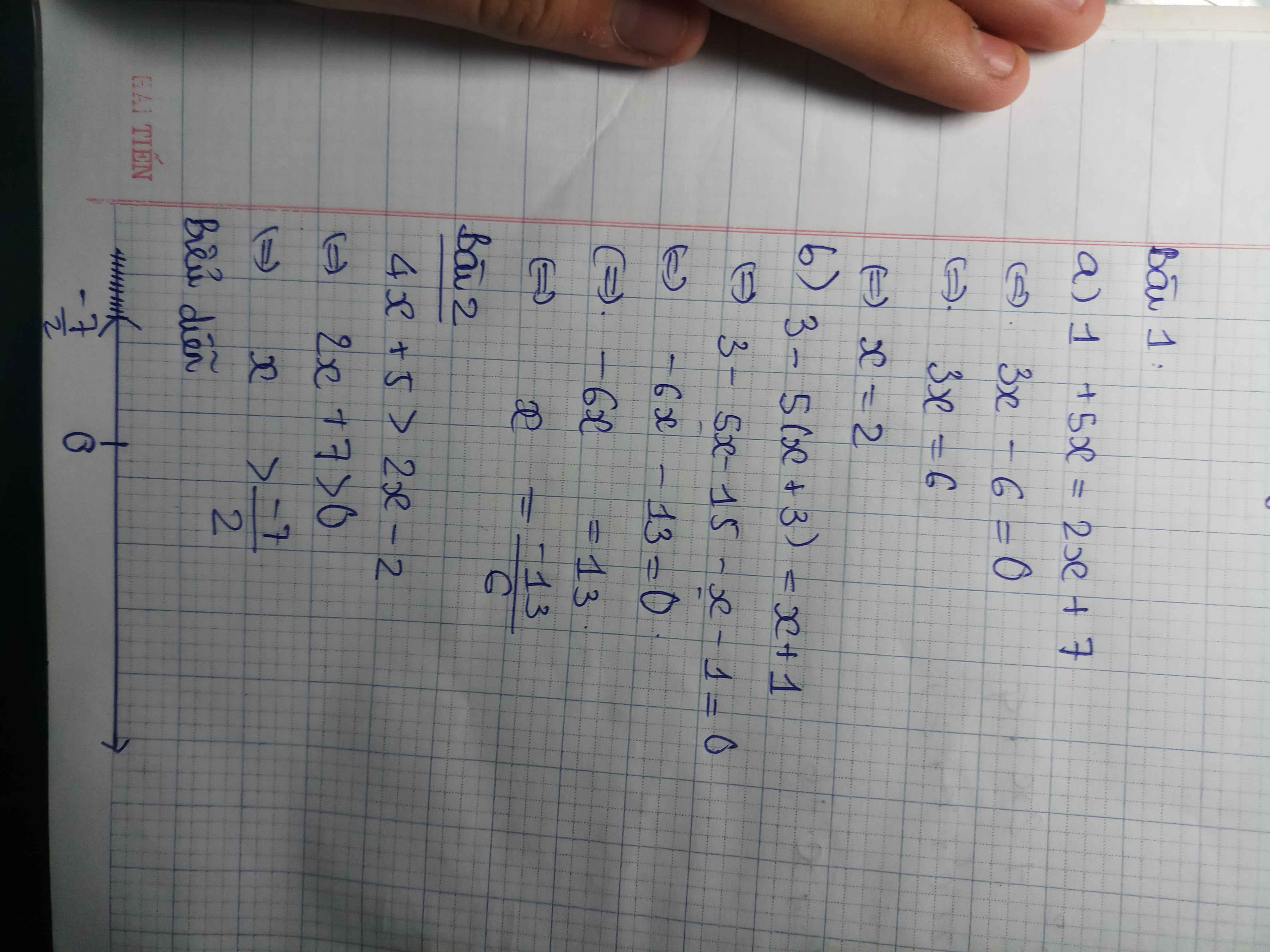\(\left(\dfrac{1}{3}\right)^{2x-1}=3^5\)
Hãy nhập câu hỏi của bạn vào đây, nếu là tài khoản VIP, bạn sẽ được ưu tiên trả lời.


Lời giải:
ĐKXĐ: $x\neq 0; \frac{-3}{2}; \frac{-1}{2}; -3$
PT $\Leftrightarrow (\frac{1}{x}-\frac{3}{2x+1})+(\frac{5}{2x+3}-\frac{4}{x+3})=0$
$\Leftrightarrow \frac{1-x}{x(2x+1)}+\frac{3-3x}{(2x+3)(x+3)}=0$
$\Leftrightarrow \frac{1-x}{x(2x+1)}+\frac{3(1-x)}{(2x+3)(x+3)}=0$
$\Leftrightarrow (1-x)\left[\frac{1}{x(2x+1)}+\frac{3}{(2x+3)(x+3)}\right]=0$
TH1: $1-x=0\Leftrightarrow x=1$ (tm)
TH2: $\frac{1}{x(2x+1)}+\frac{3}{(2x+3)(x+3)}=0$
$\Rightarrow (2x+3)(x+3)+3x(2x+1)=0$
$\Leftrightarrow 8x^2+12x+9=0$
$\Leftrightarrow (2x+3)^2+4x^2=0$
$\Rightarrow (2x+3)^2=x^2=0$ (vô lý)
Do đó $x=1$ là nghiệm duy nhất.

\(\left(x-1\right)^3-\left(x-1\right)\left(2x-3\right)\left(3x-5\right)+\left(2x-3\right)^3-\left(x-1\right)\left(2x-3\right)\left(3x-5\right)+\left(3x-5\right)^3-\left(x-1\right)\left(2x-3\right)\left(3x-5\right)=0\)
\(\Leftrightarrow\left(x-1\right)\left(\left(x-1\right)^2-\left(2x-3\right)\left(3x-5\right)\right)+\left(2x-3\right)\left(\left(2x-3\right)^2-\left(x-1\right)\left(3x-5\right)\right)+\left(3x-5\right)\left(\left(3x-5\right)^2-\left(x-1\right)\left(2x-3\right)\right)=0\)
\(\Leftrightarrow\left(x-1\right)\left(x-2\right)\left(7-5x\right)+\left(2x-3\right)\left(x-2\right)^2+\left(3x-5\right)\left(x-2\right)\left(7x-11\right)=0\)
\(\Leftrightarrow\left(x-2\right)\left(\left(x-1\right)\left(7-5x\right)+\left(2x-3\right)\left(x-2\right)+\left(3x-5\right)\left(7x-11\right)\right)=0\)
\(\Leftrightarrow\left(x-2\right)\left(18x^2-63x+54\right)=0\)
\(\Leftrightarrow\left[{}\begin{matrix}x-2=0\\18x^2-63x+54=0\end{matrix}\right.\)
\(\Leftrightarrow\left[{}\begin{matrix}x=2\\x=\dfrac{3}{2}\end{matrix}\right.\)

Bài 1:
a) Ta có: \(2\left(3-4x\right)=10-\left(2x-5\right)\)
\(\Leftrightarrow6-8x-10+2x-5=0\)
\(\Leftrightarrow-6x+11=0\)
\(\Leftrightarrow-6x=-11\)
hay \(x=\dfrac{11}{6}\)
b) Ta có: \(3\left(2-4x\right)=11-\left(3x-1\right)\)
\(\Leftrightarrow6-12x-11+3x-1=0\)
\(\Leftrightarrow-9x-6=0\)
\(\Leftrightarrow-9x=6\)
hay \(x=-\dfrac{2}{3}\)

\(\Leftrightarrow\sqrt[3]{2x+4}=\dfrac{2x-1+5}{\sqrt[3]{\left(2x-1\right)^2}-\sqrt[3]{5\left(2x-1\right)}+\sqrt[3]{25}}\)
\(\Leftrightarrow\sqrt[3]{2x+4}=\dfrac{2x+4}{\sqrt[3]{\left(2x-1\right)^2}-\sqrt[3]{10x-5}+\sqrt[3]{25}}\)
=>\(\sqrt[3]{2x+4}\left(\dfrac{\sqrt[3]{\left(2x+4\right)^2}}{\sqrt[3]{\left(2x-1\right)^2}-\sqrt[3]{10x-5}+\sqrt[3]{25}}-1\right)=0\)
=>2x+4=0
=>x=-2

\(\left(2x-1\right)^2+5=\left(2x+3\right)\left(2x-3\right)-x\)
\(\Leftrightarrow4x^2-4x+1+5=4x^2-9-x\)
\(\Leftrightarrow4x^2-4x^2-4x+x=-9-5-1\)
\(\Leftrightarrow-3x=-15\)
\(\Leftrightarrow x=5\)
Vậy x=5

\(a,\dfrac{x-3}{x}=\dfrac{x-3}{x+3}\)\(\left(đk:x\ne0,-3\right)\)
\(\Leftrightarrow\dfrac{x-3}{x}-\dfrac{x-3}{x+3}=0\)
\(\Leftrightarrow\dfrac{\left(x-3\right)\left(x+3\right)-x\left(x-3\right)}{x\left(x+3\right)}=0\)
\(\Leftrightarrow x^2-9-x^2+3x=0\)
\(\Leftrightarrow3x-9=0\)
\(\Leftrightarrow3x=9\)
\(\Leftrightarrow x=3\left(n\right)\)
Vậy \(S=\left\{3\right\}\)
\(b,\dfrac{4x-3}{4}>\dfrac{3x-5}{3}-\dfrac{2x-7}{12}\)
\(\Leftrightarrow\dfrac{4x-3}{4}-\dfrac{3x-5}{3}+\dfrac{2x-7}{12}>0\)
\(\Leftrightarrow\dfrac{3\left(4x-3\right)-4\left(3x-5\right)+2x-7}{12}>0\)
\(\Leftrightarrow12x-9-12x+20+2x-7>0\)
\(\Leftrightarrow2x+4>0\)
\(\Leftrightarrow2x>-4\)
\(\Leftrightarrow x>-2\)

\(\Leftrightarrow\left(3x-5\right)^3-3\left(x-1\right)\left(2x-3\right)\left(3x-5\right)+\left(2x-3\right)^3+\left(x-1\right)^3=9\left(x-2\right)^2\left(2x-3\right)\)
\(\Rightarrow x^2-4x+4=0\)
\(\Rightarrow\left(-4\right)^2-4\left(1.4\right)=0\)(cái này là D )
\(\Rightarrow x_{1,2}=\frac{-b+-\sqrt{D}}{2a}=\frac{4+-\sqrt{0}}{2}\)
\(\Rightarrow2x-3=0\)
\(\Rightarrow2x=3\)
\(\Rightarrow x=\frac{3}{2}\)hoặc\(x=2\)
aGiải phương trình |x-1|+|x-2|=|2x-3|
b)Giải phương trình 1/(x−2 )+ 2/(x−3) − 3/(x−5) = 1/(x^2 −5x+6)


`(1/3)^(2x - 1) = 3^5`
`=> (3^(-1))^(2x - 1) = 3^5`
`=> 3^(-1.(2x-1)) = 3^5`
`=> 3^(1-2x) = 3^5`
`=> 1 - 2x = 5`
`=> 2x = 1 - 5`
`=> 2x = -4`
`=> x = -2`
Vậy `x = -2`